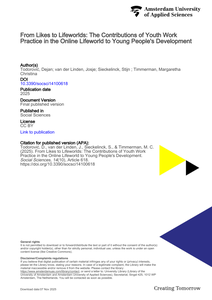Universities have the potential, and the responsibility, to take on more ecological and relational approaches to facilitating learning-based change in times of interconnected socioecological crises. Signs for a transition towards these more regenerative approaches of higher education (RHE) that include more place-based, ecological, and relational, ways of educating can already be found in niches across Europe (see for example the proliferation of education-based living labs, field labs, challenge labs). In this paper, the results of a podcast-based inquiry into the design practises and barriers to enacting such forms of RHE are shown. This study revealed seven educational practises that occurred across the innovation niches. It is important to note that these practises are enacted in different ways, or are locally nested in unique expressions; for example, while the ‘practise’ of cultivating personal transformations was represented across the included cases, the way these transformations were cultivated were unique expressions of each context. These RHE-design practises are derived from twenty-seven narrative-based podcasts as interviews recorded in the April through June 2021 period. The resulting podcast (The Regenerative Education Podcast) was published on all major streaming platforms in October 2021 and included 21 participants active in Dutch universities, 1 in Sweden, 1 in Germany, 1 in France, and 3 primarily online. Each episode engages with a leading practitioner, professor, teacher, and/or activist that is trying to connect their educational practice to making the world a more equitable, sustainable, and regenerative place. The episodes ranged from 30 to 70 min in total length and included both English (14) and Dutch (12) interviews. These episodes were analysed through transition mapping a method based on story analysis and transition design. The results include seven design practises such as cultivating personal transformations, nurturing ecosystems of support, and tackling relevant and urgent transition challenges, as well as a preliminary design tool that educational teams can use together with students and local agents in (re)designing their own RHE to connect their educational praxis with transition challenges. van den Berg B, Poldner K, Sjoer E, Wals A. Practises, Drivers and Barriers of an Emerging Regenerative Higher Education in The Netherlands—A Podcast-Based Inquiry. Sustainability. 2022; 14(15):9138. https://doi.org/10.3390/su14159138
DOCUMENT

Object-based media gaan grote invloed hebben op hoe we media maken en verhalen vertellen. Daar ben ik van overtuigd sinds ik in februari bij een NPO Innovatie -sessie hoorde over deze manier van werken. Het maakt interactieve storytelling mogelijk en stelt de maker centraal in een werkveld waarin AI-tools steeds prominenter worden.
LINK
As youth workers increasingly offer support and guidance within digital environments, the question arises as to what impact this support has on the (online) lives of young people. This paper explores the contribution of youth work practice in the online lifeworld on young peoples’ development, building on previous studies concerning youth work outcomes and the developmental needs of young people. A qualitative research design was employed, including digital diaries of youth workers and semi-structured interviews with both young people (N = 37) and youth workers (N = 25). The findings highlight the role of youth work in helping young people navigate social media; develop new skills, talents, and social connections; and increase awareness of online risks. Youth workers also support young people in coping with negative online experiences, including loneliness and mental health challenges. The contribution of online youth work is less visible in certain aspects of developmental needs, namely online safety and privacy, self-image, and assessing online information. This paper concludes by emphasising the need for further research into the long-term impact of youth work in the online lifeworld, particularly in light of rapid technological developments, the growing influence of artificial intelligence, and the increasing involvement of youth in digital forms of crime. The findings described in this study can form a base for future research to better understand the impact of these emerging issues on youth development and youth work practice, as well as to develop appropriate interventions.
DOCUMENT
